23rd July 2025
Fifteen gamers and seven different games this session, travelling the world and space with lots of trees, bees, dogs and ghosts.
A couple of games had been organised in advance on Discord, Apiary and a rematch of Tycoon: India 1981.
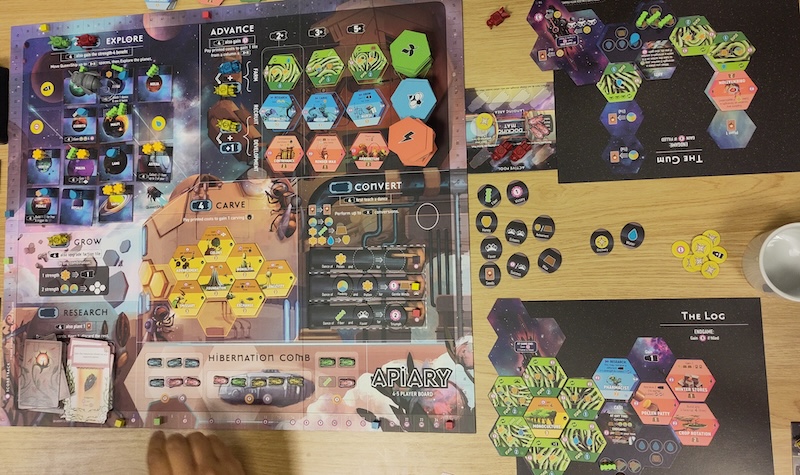
Four players took command of factions of spacefaring, intelligent bees in the worker-placement game Apiary. Worker bees are sent out to explore planets, gather resources, develop technology and expand their hive ship. Bees grow in strength after each action until eventually taking their place in the hibernation comb, which serves as the game’s timer as it fills up. The players all pursued different strategies, with Iain’s workers busily flying to and from the hive, earning the Queen bee’s favour and establishing an early lead, which he held for much of the game. Reynaldo made good use of specialist recruits and planted seeds for end-game points, while Steph focussed on expanding her hive with farms. Meanwhile, Dan developed a wax-based economy fuelled by an impressive bee dance, which, although perhaps not as graceful as Iain’s, accumulated points at a steady rate. By the time the hibernation combs were full, Steph’s hive expansion had done enough to buzz past Iain into second place, but nobody could challenge first-time player Dan, whose strategy of dancing and monoculture made his colony the finest of the space bees.
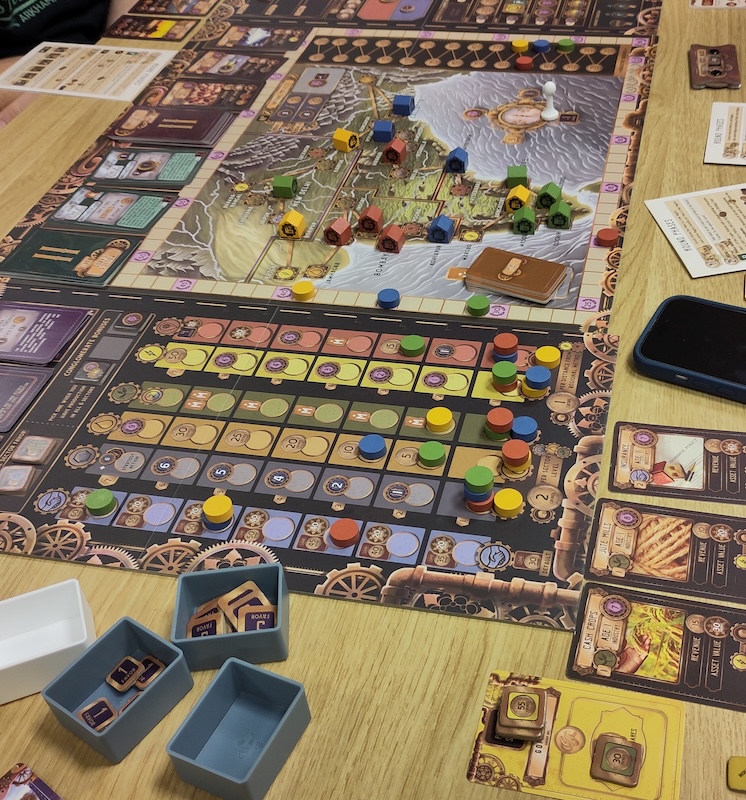
On another table, the same four protagonists (Jyo K, Darren C, Simon W and Steve L) reconvened to give Tycoon: India 1981 another try after the half-baked attempt in the last session which saw play abandoned after a pretty big rules mistake and some horrendous early game decision making (see Blog 106 for an overview of how the game plays; Steve still winces whenever Darren reminds him much he overpaid for a third rate business in the opening auction).
The short version is that “Steve was bombarded from all sides but skilfully and assuredly was victorious”, though that might not be the whole truth.
Click here for a more in-depth story of how things really unfolded this time...
In the meantime, three of the players had managed a full game at a recent convention and felt fairly confident about how it all works. However, this was only game 2.0 for Simon, who was still relying on listening to a ‘how to play’ video while driving a fortnight ago for his understanding of rules and scoring. The more seasoned players helpfully shared some of their newly gained insights to level the field a bit (“don’t spend 2/3rds of your opening money on cruddy companies; it doesn’t help”) and Simon was also boosted by being randomly allocated Tycoon status for the first round. Being Tycoon brings an extra action, which is significant when players usually have only two actions per round to get everything done. It does come at a price though, as the starting Tycoon has less money to work with until businesses start to produce revenue and dividends begin to flow in round 3.
Jyo won the first auction (becoming next turn’s Tycoon as a result) and first pick from the industries on offer. This set her on the path to pursue an asset value victory, by acquiring and then constructing the core industries that are foundational to a modern industrialised economy (oily stuff, money stuff, rocky stuff, sparky stuff, drivey stuff and growy stuff; see Blog 106). This time, second pick of industry wasn’t bad, which would have been of some consolation to Steve if he had won it. But he didn’t. Spurred on by this early setback, Steve decided to focus on the influence track instead, thumbing his nose at the high asset value industries which produce most revenue (mining, telecoms, airlines and the like), preferring low-end basics (farming co-operatives, jute production; trust me, it’s the next big thing), which nevertheless give high influence rewards. Darren was evidently holding out for a mythical doughnut franchise to appear on the industry board (low revenue and low influence, but yummy) and was reluctantly forced to choose something less tasty when it became clear this wasn’t going to happen, losing momentum as a result. This setback only compounded his game long frustration at the total absence of purple playing pieces, an unforgivable oversight on the part of the publisher.
For his part, Simon sought to rival Jyo on the asset value track and over the course of the game used the revenue generated by his industries to good effect by building the largest portfolio of other players’ shares. Although this gives a good dividend inflow, the purchase price goes directly to the investee player, significantly increasing their ability to buy shares in their turn. So, an aggressive investment strategy becomes something of a double-edged sword (thanks to Jyo for pointing this out, several times!), but it does also give escalating influence bonuses each time a new share is bought. With all this to think about, Simon somehow still found time to point out a rules mistake that the others had missed, modestly stating that his ability to do so with so little prep was down to having played thousands of games rather than being 100% a rules lawyer.
Play progressed smoothly, with only the occasional call of the now well-established ‘Cheetah sounds’ to alert the room that someone had forgotten to pay for something or temporarily gained some other non-rules supported advantage. As play entered the final rounds, Jyo held a narrow edge over Simon on asset value, while Steve seemed to have built a decisive lead on the influence track. Darren still trailed on both tracks but given the absence of both doughnuts AND purple pieces this was understandable. Crunching the numbers and concluding that he was unlikely to be able to overtake Jyo, Simon made a late game flip to prioritize influence instead, ramping up his share purchases for the incremental benefit each new investment gives. This change of focus saw the gap narrow alarmingly (if your name is Steve), before Simon surged into the lead at one point. To counter this, Steve hit the politics action as often as he could and used his extra promoters (gained as compensation for missing out in all those industry auctions) to fund strategy actions giving influence boosts. Thankfully (if your name is Steve), these panic measures were enough to see off Simon’s late charge and give Steve first place on the influence track.
Securing top spot on both tracks guarantees victory, but with Jyo firmly established as asset value queen that didn’t happen here and it is probably pretty difficult to achieve in practice. In a nice rules mechanic, the game uses ‘favour’ (thematically representing each player’s standing with the national government) as a third scoring element to determine overall victory if the results are split. Jyo had all but conceded the win to Steve, whose policy focus had garnered lots of favour over the 10 rounds. However, Jyo’s very last action of the game had gained her three extra favour (maximum 12/12 on her hidden ‘corporate objectives’ card) and Steve’s lead was under serious threat as it became apparent that his choice of objective had been the wrong option of the two on offer at the start of the game. I mean, who would imagine that yellow shares would be so popular with the others when Steve was obviously pursuing political influence over industrial muscle? Needing only seven favour from his objective card to cement the win, Steve choked at the end, handing Jyo a narrow victory (if your name is Jyo) although others claimed it was really a draw (if your name is Steve).
All agreed this is a very good game indeed and well worth trying out if you get a chance.
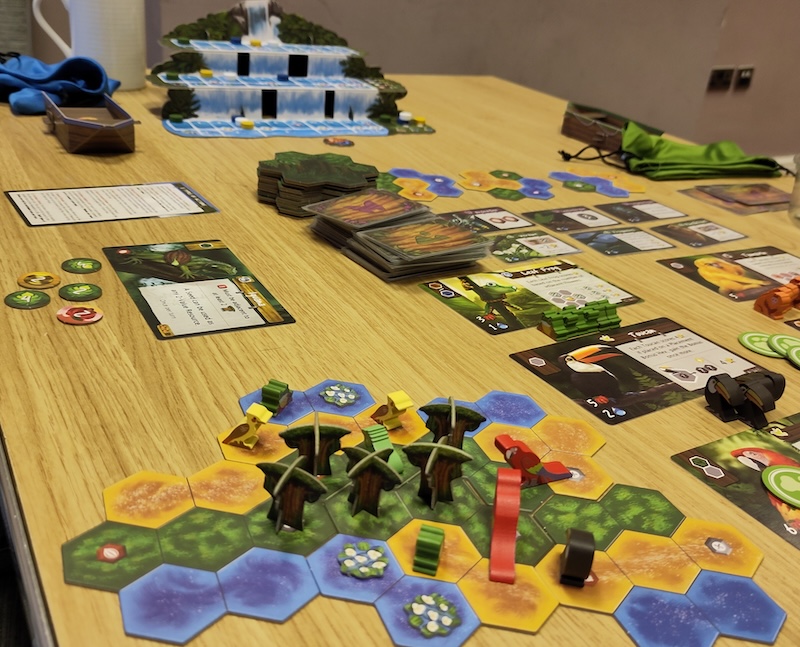
Another table got stuck straight into Life of the Amazonia. This is a new game to club and soon acquired two new players with its attractive cards, tiles and animal meeples. It is a bag builder, so everyone starts with the same 10 tokens available covering the four resource types; money, leaves, water and fruit. Each round you draw five tokens from your bag and make the most of them, either buying better value tokens, terrain tiles, trees, water lilies, animals (8 types) or scenery cards which give instant or end game bonuses. Victory points come from the three scoring tracks related to how big your forest is and how many plants are in it, the animals which all have different ways to score and end game cards. During the game you can pick up bonuses from placing animals on certain terrain hexes and compost tokens to remove the original low value ones from your bag.
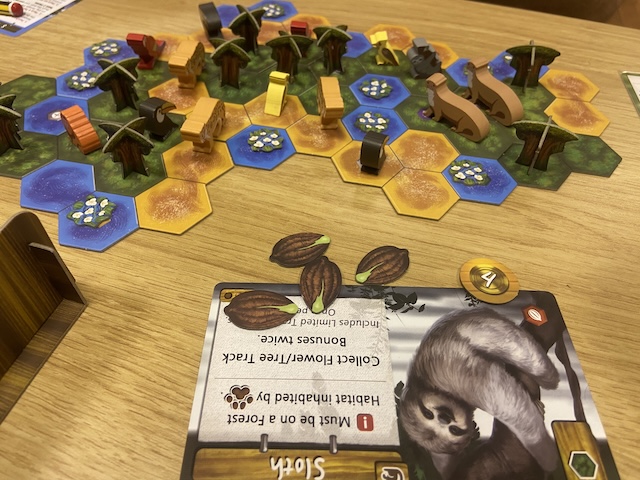
Each player starts with one unique animal that gives a specific bonus such as making one type of item cost less to acquire. Dave (iguana bonus) and James (sloth bonus) both started with a forest and macaw based strategy acquiring tiles with more forest than wetland and water terrain types and planting lots of trees to make the macaws score more. Kathy (hoatzin bonus) went aquatic growing her river and gradually adding more animals to it; frogs, caimans, giant otters and tamarins (presumably in the trees above the river!). After a few rounds the gameplay mechanics had become clear and everyone enjoyed the challenge of utilising their token draws and working towards some of the many scoring options and trying to combine strategies to optimise points. James was the eventual winner with some good track scores, otters, jaguars, macaws and end game cards.
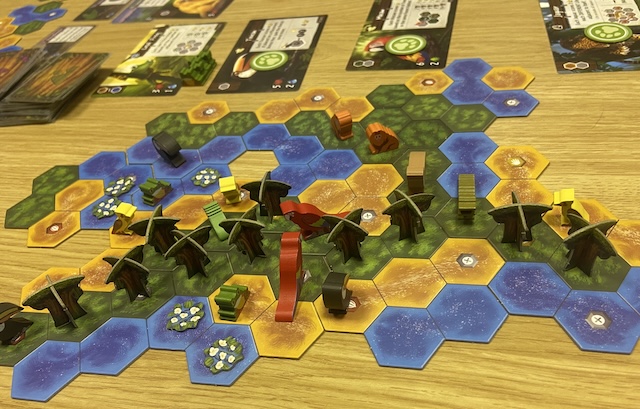
The final table played a couple of games of Forbidden Island to give any stragglers time to arrive. This was a fifth play at club for this lighter cooperative game.
Two intrepid explorers sat down to Forbidden Island, but were quickly joined by two others who had obviously parachuted in late! We had landed on an island called The Perilous Peaks (a different island configuration to normal), where we unfortunately found both golden lion temples were up the two peaks. With a very unlucky start the waters rose and one of the temples sank and the other was cut off! But all was not lost as we had a diver with us. This fortune was short lived as fate decided we were not meant to succeed, as we couldn’t save this lone temple and had to evacuate without securing any treasures!
Undeterred the 4 tried again (on the same difficult island) and this time it was going well, with 2 treasures secured and a third soon to be collected, when disaster struck and the water rose twice in quick succession where both earth temples sank into the ocean, meaning we once again had to abandon the quest without all the relics.
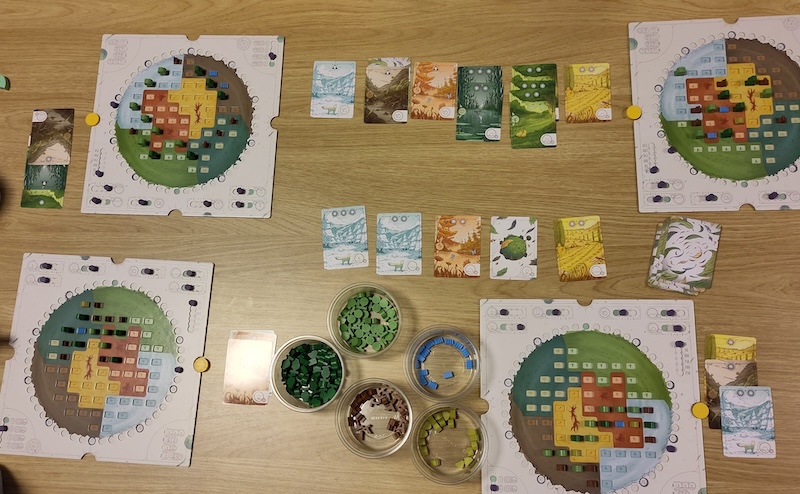
As a change of scene the four failed adventurers then tried Evergreen that Richie brought, which is a bit like Photosynthesis but on a grander scale of reforesting a whole planet, rather than just a, err, forest. Each turn players select a card from a tableau of 5, which determines which of the 6 biomes (flowers, ice, rock, grass, swamp, wheat) you can perform one of 3 actions in - plant three sprouts (saplings), grow two trees, plant a sprout and grow a tree. If you don’t like the biome card you can instead plant a sprout or grow a tree in any other biome. The cards also have a special power which can plant saplings, grow trees, gain points, place rivers (which help grow 2 adjacent trees) or add a bush (which can help connect trees to form continuous forests). The card left over goes into fertility pile according to biome and is used for final round scoring, so you can try and rig it to a particular biome if you are lucky.
The game is played in 4 seasons with a decreasing amount of turns for collecting biome cards. At the end of a season, you score points for all the trees that gain light and are not shaded by other trees, and your largest connected forest of trees (not sprouts). The sun then moves clockwise around to the next side of your board for the new season. At the end of the last season you also score your fully grown trees according to the sum of symbols on all the fertility cards collected per biome.
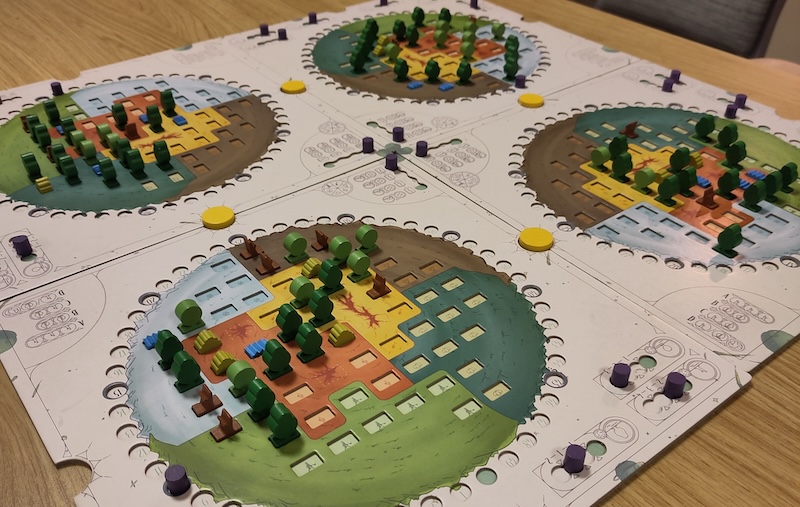
In this first game for most (Jeremy had played once before on BGA), the players were trying to figure out good strategies for scoring, with most going for large trees at diagonals so they would score no matter where the sun was. Jeremy was concentrating on largest forest and was getting a tidy sum every season, whereas Richie tried banking on on the most fertile land (grass) and reaping end game points. It was a fun game of building a forest and growing trees, but in the end it was Graham’s strategy of building a ring of mature trees around his planet that scored the most points, with Neil’s planet coming second, just beating Jeremy by a point. Unfortunately Richie had scored so few points during the other rounds that even though netting 34 points for the fertile grasslands, it couldn’t bring him anything but last place.
Then Mysterium Park was also back for a fifth play to see if the ghost could influence the psychics to solve another carnival murder. Neil the Ghost had no difficulty in telling two of the mediums who were innocent bystanders and which places weren’t the scenes of the crime, it turned out to be more difficult to give the right visions to Richie, even with the other psychics helping. But in the end they reduced the pool of suspects and locations to three and unanimously agreed on the correct culprit - the daredevil artist on the stage - due to some excellent last visions from the Ghost.
Those that could stay for one last game tried Spots, on its third club play, first out in Session 92. A push your luck dice rolling game. The seven cards with the dice options randomly selected at the game start were an unusual combination making it a bit of a grind to fill the cards but Kathy’s slow and steady just won out over Richie and Dave’s more risk based approach.
The next session is the 6th August and the first session with the new price rise to £7 to cover increased venue hire fees. Bring your games along and choose on the night or keep a watch on the Discord channel to influence or book your seat for those games.
- Total Session Attendance: 15
-
Board Games: